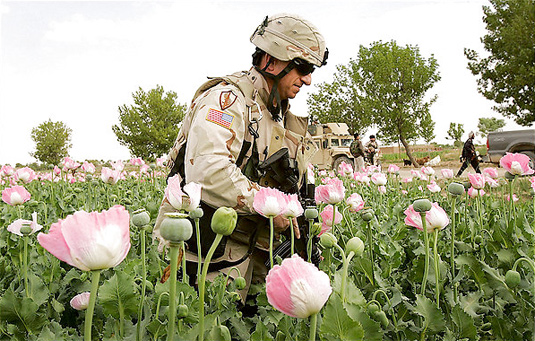
From Simon Shuster, Time: On the international stage, Russia’s Afghan heroin issue has become the country’s favorite crusade, and has allowed Russia to enter a global debate about Afghanistan that had previously left it on the sidelines. Its basic point is a reasonable one: NATO has fueled drug production by refusing to destroy Afghan poppy fields, which it stopped doing last year in the hope of winning the support of opium farmers. Perhaps less reasonable is Russia’s belief that its heroin problem is caused not by its porous borders or its abysmal treatment of addiction (methadone therapy is illegal in Russia) but by NATO’s policy on drugs in Afghanistan. Yet that is what Russian officials contend, and this week they embarked on a campaign of coordinated fuming over the issue. …
In its way, Russia is making an important point. Between 2005 and 2009, Afghanistan’s yearly opium output jumped from 4,000 to 7,000 tons, and it now accounts for more than 90% of global supply, according to the United Nations. Russian state statistics say that opiates such as heroin and morphine kill around 30,000 Russians every year, three times more than the total number of Soviets killed during their 10-year war in Afghanistan in the 1980s. And the U.N. also says that the $65 billion earned every year from the sale of opiates partly goes to finance terrorists around the world, including the Taliban militants that the U.S. is fighting in Afghanistan.
But Russia is wrong to claim that NATO is ignoring the problem. NATO’s March offensive in Marjah redoubled the crackdown on drug traffickers with the aim of cutting the Taliban off from its main source of funding, and U.N. data shows that Afghan opium production has fallen by about 15% since its peak in 2007. Russia insists that is not nearly enough, and has consistently offered the help of its own military alliance, the Collective Security Treaty Organization (CSTO), in stemming the flow of drugs through Central Asia and the Caucasus. (photo: Getty)
Image: getty%206%2012%2010%20poppies%20afghanistan.jpg
